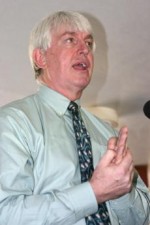Budget cuts spur stressful decisions

Official decisions on USF’s budget have yet to be made, but the Provost’s Office has felt the effects of these choices for months.
Layoffs are expected as USF strives to cut spending, and Provost Ralph Wilcox said he is conscious of the human face behind each eliminated salary.
“I am aware of the fact that some of the decisions that will be made in the future will impact the lives of some people in a difficult way,” he said.
Decisions like layoffs often have an impact on the life of the person who makes them, said Dr. Richard Schrot, associate professor in the Department of Family Medicine. Schrot teaches future doctors how to deliver painful news, and said administrators like Wilcox would likely be affected.
“No matter how many times you deliver bad news, it’s always difficult,” he said.
Depending on the person, Schrot said, the consequences of budget cuts, such as layoffs or restructuring, can produce varying results.
“It depends on your personality and how you handle stress,” he said. Those who do not properly relieve stress could experience chronic anxiety, insomnia, irritability and poor concentration.
Senior Vice Provost Dwayne Smith said the budget crisis has increased his work duties.
“We have had this constant focus on the budget issue,” he said. “It has taken an inordinate amount of time. At the same time, usual business has to go on.”
Smith and his staff manage all aspects of academic affairs, but have never faced such a monumental task, he said.
“I can say, hands down, that this is the most difficult time of my career.”
Part of the challenge is managing the University from a monetary standpoint as well as acknowledging the individuals that are affected, Smith said.
“This whole process – for me – really does have a very human face,” he said. “At the same time we are making decisions that might cost someone their job, we might actually be saving someone else’s (job).”
The sentiments surrounding this situation are typical of layoffs in the business world, said industrial psychologist Paul Spector.
“It’s not only traumatic for people that lose their jobs,” he said. “It’s traumatic for the survivors that keep their jobs.”
A common reaction, Spector said, is to blame the leaders in close proximity, such as the Provost, rather than more direct sources, such as legislators in Tallahassee.
“A lot of faculty are very angry about this,” he said. “That (anger) will be directed at local people.”
While some faculty members have lashed out at the administration, Smith said, others understand their predicament.
“I’ve also gotten a surprising amount of support from people who don’t envy the task we are faced with,” he said.
Wilcox said he promotes the idea of the collective good in tough budgetary times and is firmly committed to protecting the welfare of the University as a whole.
“We are very much guided by our strategic plan and the institution’s priorities,” he said. “If there is comfort, it’s that we are treating everyone equitably.”
Additional comfort might be granted by a potential tuition increase. Wilcox and Smith said that a tuition increase – once approved by the governor – would save jobs at USF. It is a small consolation when faced with such massive reductions, they said.
“Tuition increases at the level being contemplated … won’t come anywhere close to offsetting the magnitude of the budget cuts that we have already taken,” Wilcox said.






